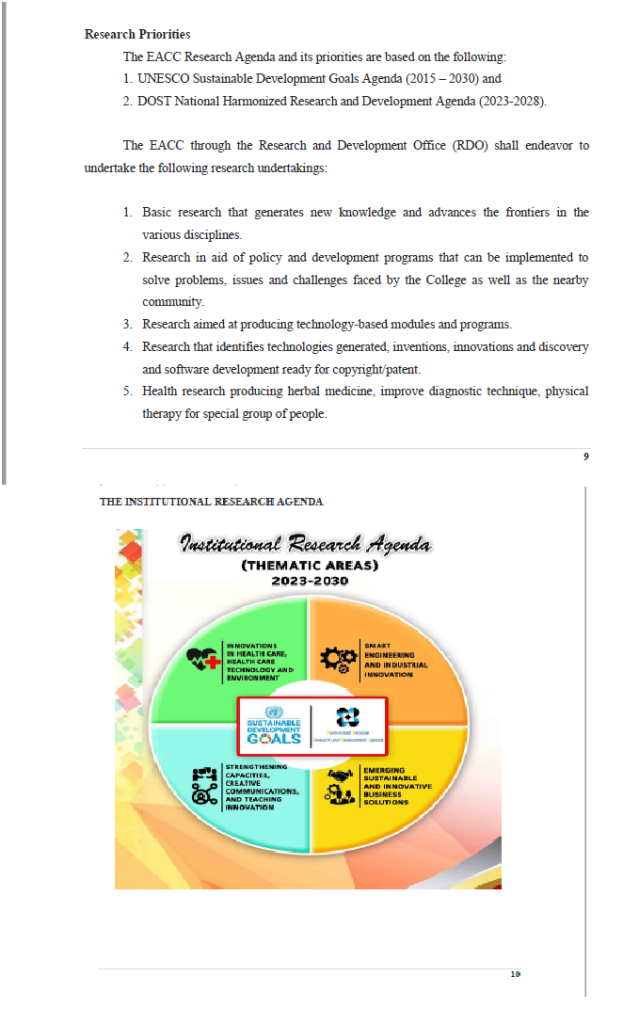The Research and Development Office
Research is one of the three key functions of higher educational institutions (HEIs), amongst instruction and extension. In keeping the philosophy and objectives of Emilio Aguinaldo College towards the fulfillment of its Vision-Mission, the College strives to keep up with the challenges and demands brought about by changes in the socio-economic condition of the country. The College aims generally for the service of humanity through its relevant research programs and projects. The mission of the school is primarily to develop a total person of broad tolerant and intelligent perspective, able to enhance his quality of life and contribute to the total development of the country through quality education in the field of Art, Science and Technology of Radiologic practices.
The Research and Development Office was created by the Board of Trustees in its regular meeting held last August 22, 1994 with Cecilia P. Reyes, Ph.D. as its founding Director. The RDO aims to utilize its human resource in formulating and conducting research programs/projects within the priority areas of the institution and of the national government. Specifically, the office aims to:
- To develop the research capacity and capability of the faculty and students
- To establish research culture in the institution
- To encourage researchers to establish collaboration with students and researchers in other institutions
Linkages
The Institution has forged linkages with different partners in pursuit of its research goals.
These include government agencies, non-government organizations, professional organizations, local government units, and other academic institutions.
- PAPSCU Excellent Academic Research Link (PAPSCU-PEARL)
- Philippine Council for Health Research and Development (PCHRD)
- Philippine Health Research Ethics Board (PHREB)
- Department of Science and Technology (DOST)
- National Research Council of the Philippines (NRCP)
- Southern Tagalog Consortium for Industry and Energy Research and Development (STCIERD)
- Network of Cavite Laguna Batangas Rizal Quezon Educational Institutions (NoCEI)
Research Agenda and Priority Areas

Services offered by RDO:
- Research Orientation for the Faculty and Students
- Faculty Research Applications
- Faculty and Students Research Colloquia
- Faculty and Students Journals of Multidisciplinary Research
- Research seminars, workshops, and conferences
- Research procedures review
- Issuance of the Research Ethics Review Certificate
Research Committees
Ad Hoc Committee
As part of the Research Ad Hoc Committee, their main functions are as follows:
-
- Verifies, reviews and updates the policies and guidelines in the research manual;
- Recommends and standardizes the incentive schemes for research presentations and publications; and
- Recommends scholarly papers/projects for exemplary awards.
Ethics Committee
As part of the Ethical Review Panel, their main functions are as follows:
-
- Reviews research proposals and protocols endorsed by the Deans/Heads of the different Schools and Departments; and
- Ensures that ethics in research is adhered to.
Research Coordinators
As Research Coordinators, their main functions are as follows:
-
- Review, formulate, recommend and monitor the implementation of research policies and guidelines;
- Identify potential researchers and facilitate conceptualization of students, teaching and non-teaching research projects;
- Screen research proposals and evaluate outputs; and
- Coordinate the tasks and activities of RDO with different Schools and Departments.
Conference Proceedings
- AVCMR (Asian Virtual Conference on Multidisciplinary Research) – July 24-25, 2020
- 1st EACCIMRC (1st Emilio Aguinaldo College Cavite International Multidisciplinary Research Conference) – March 26-27, 2021
- 2nd EACCIMRC (2nd Emilio Aguinaldo College Cavite International Multidisciplinary Research Conference) – July 28-29, 2022
- 3rd EACCIMRC (3rd Emilio Aguinaldo College Cavite International Multidisciplinary Research Conference) – July 3-4, 2023
- 4th EACCIMRC (4th Emilio Aguinaldo College Cavite International Multidisciplinary Research Conference) – December 12, 2024
Institutional Research Journal
- Faculty Research Journal ( Oct. 2017 | Nov. 2018 | Dec. 2019 | Dec. 2020 | Academic Year 2021-2022 | Academic Year 2022-2023 | Academic Year 2023-2024 )
- Student Research Journal ( Oct. 2017 | Nov. 2018 | Dec. 2019 | Dec. 2020 | Academic Year 2021-2022 | Academic Year 2022-2023)